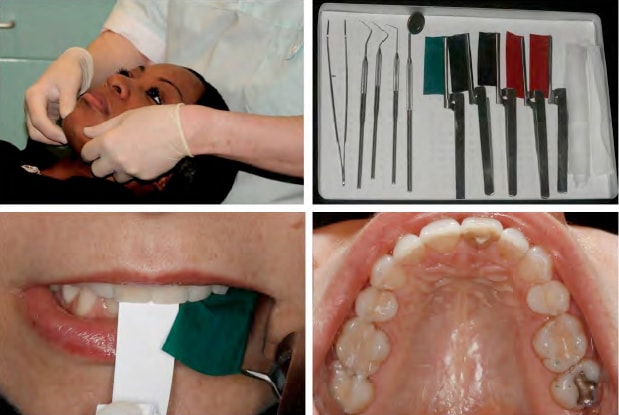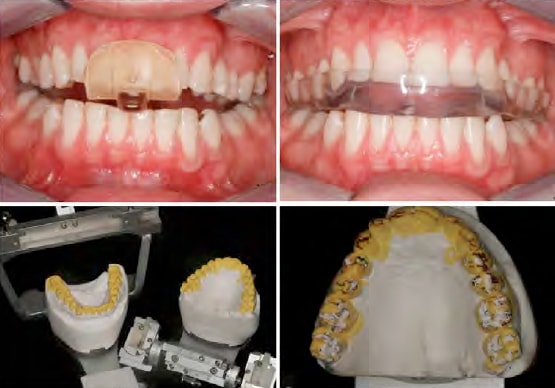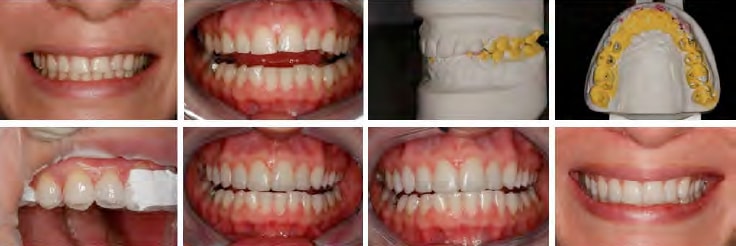ADS ALUMNI ONLY
Programme updated with Digital vs Analog Workflows for 2024 uptake
The problem
“Do you know a good occlusion course?” is a question that we have been asked many times over the years. Unfortunately ‘occlusion’ is not a subject that can be discussed on its own. It is a part of every restorative or orthodontic treatment plan, yet, it is often taught in isolation. To add to the confusion, there are many different approaches that all achieve the same or similar results for the patient. Frequently there is more than one ‘right’ answer.
The solution
To master the combination of aesthetics and function it is necessary to consider occlusion in the context of the problems you are likely to face at the chairside in planning and delivering treatment.
This course is intended to allow practitioners who have a degree of prior knowledge to consolidate their diagnostic and treatment skills to treat more complex cases with confidence. We will draw on what has already been covered in the Cosmetic & Aesthetic Restorative Dentistry Year Course and build on some of the more advanced topics, supplemented with hands-on exercises.
In order to unravel some of the confusion that surrounds occlusion, we will adopt our usual comprehensive approach, identifying the similarities and significant differences between the occlusal philosophies of Gnathology, Pankey, Dawson, Kois, Spear, Bioaesthetics, and Neuromuscular (amongst others), together with the different joint positions and articulators associated with each.
Following on from this, we will consider a comprehensive clinical examination that can be used to screen all patients for occlusal problems and differentiate between the healthy and unhealthy occlusal systems. The emphasis will be on identification of the ‘high-risk’ patient or the patient who needs specific TMJ management before restorative treatment can be undertaken.
The rest of the course will cover management of problems in different parts of the occlusal system, whether this is the teeth, the TMJs or the muscles. We will look at appliance therapy, again adopting a comprehensive approach to compare and contrast different appliances. We will also look at the current state of knowledge on tooth wear and bruxism and relate this to restorative dental management, again with an emphasis on risk management for the ‘occlusally dangerous’ patient so that treatment can be sequenced correctly and the risks managed during its delivery.
Through practical exercises on comprehensive examination, equilibration, build-ups for the worn dentition and appliance therapy amongst others, we will show you how to build these techniques into your daily practice.
This programme is open ONLY to ADS Alumni.

Lectures
- Why occlusion is such a complicated topic
- The healthy masticatory system
- Normal function of the teeth, joints & muscles
- Envelopes of motion and function
- Symptoms of unhealthy joints, muscles & teeth
- Occlusal philosophies & instrumentation
- "It seemed like a good idea at the time" – the history of the study of occlusion
- Modern philosophies of occlusion
- An occlusal philosophy that can be applied to every patient in your daily practice
- Treatment positions: intercuspal position vs. centric relation… which one and when?
- Facebow transfer – when & how
- Articulator selection for different situations
- Adjusting the articulator: when & how
- The "comprehensive screening" exam
- "Red flags": identifying patients who require more detailed investigations
- Comprehensive examination of teeth, joints & muscles
- CR bite records
- Load testing
- Deprogramming at the chairside
- Case records for treatment planning
- Optimising the patient’s occlusion
- Occlusal equilibration: what, why, when & how
- Trial equilibration: when & how
- Treatment sequencing & delivery for the occlusally simple case
- Restorative update
- Adhesion to natural tooth and other substrates
- Selection, preparation & cementation guidelines for ceramic restorations
Practicals
- Comprehensive clinical examination
- Centric relation bite records
- Trial equilibration on models

Lectures
- Overview of the diseased system
- Classification(s) of TMD signs and symptoms: Wilkes, Piper, RDC-TMD & others
- Unhealthy muscles
- Signs & symptoms
- Unhealthy teeth
- Mobility & fremitus; tooth wear
- Unhealthy joints
- Aetiology, staging of intracapsular TMJ pathology
- Relating joint condition to restorative dentistry
- Appliance therapy
- Making sense of all the available appliances
- Partial coverage appliances
- Flat anterior appliances (B splint, deprogrammer)
- The Kois deprogrammer
- Other partial coverage appliances & their role in dentistry
- Role of full coverage appliances (hard & soft): Michigan, Tanner, full soft
- Appliances for unhealthy joints
- Appliances for the bruxist patient
- Managing the patient’s expectations for appliance therapy
- The acutely symptomatic patient who presents at the practice: diagnosis & management
- The chronic pain patient: options for management or onward referral
- Fitting the comprehensive exam into your practice
- Presentation of exam findings to the patient
- Talking about occlusion and occlusal disease with your patients
- Fee setting for equilibration and appliance therapy
Practicals
- Fit & adjust flat plane appliance / deprogrammer appliance
- Fit & adjust soft bite guard
- Fit & equilibrate hard upper full coverage splint and soft bite guard

Lectures
- Implementation of the diagnostic & treatment planning process for occlusally complex cases
- Treatment sequencing for complex cases
- Creating space for restorations
- The role of provisional restorations
- The worn dentition
- Aetiology & prevalence of tooth wear
- Common presentations: attrition, erosion, abrasion, abfraction
- Erosion: confirmation of diagnosis & risk management
- Attrition: Parafunction vs. bruxism, confirmation of diagnosis & risk management
- Management of the patient who will continue to brux
- Case finishing for force distribution
- Guidance and vertical dimension
- Guidance patterns
- Changing anterior guidance – effects on teeth, muscles & joints
- Vertical dimension: when to change it & when not to
- Current evidence behind concerns on alteration of OVD
- Changing vertical dimension – effects on teeth, muscles & joints
Practicals
- Complex equilibration
- Direct addition technique for provisionals
- Overlay technique for provisionals

Lectures
- Lectures Review of the diagnostic and treatment process
- Sequencing the full-mouth case in the healthy masticatory system
- Sequencing the full-mouth case in the unhealthy masticatory system
- Bite records for different restorative situations
- Complex equilibrations: The patient who cannot be easily equilibrated
- Maintenance protocols for conformative and reorganised cases
Practicals
- Treatment planning & sequencing
The emphasis in this final session is on application of the diagnostic and treatment planning principles discussed in parts 1 to 3 as well as how we can assemble our repertoire of clinical techniques into the treatment plan for the patient. You will be given the records and models for a number of patients who have already been treated at our practice and will work in small groups to develop the treatment plan (or plans).
The course is run on 8 days over 4 months.
- 22-23 January 2024
- 12-13 February 2024
- 11-12 March 2024
- 15-16 April 2024
Course fee includes:
The ADS Occlusion Tool Box, a complete starter kit of the consumable items needed for bite records and comprehensive examination will be given enabling you to implement what has been learned immediately on return to your practice.
Reading folders to complement the teaching days. As with other ADS courses this has relevant articles from the literature to give you an appreciation of the current research which is applicable to the topics being discussed, as well as classic articles on the subject.
Comprehensive lecture handouts and practical worksheets with step by step clinical protocols you can follow to implement at your own practice, as well as a selection of custom made appliances which you will fit and adjust on each other, plus all materials for the hands-on sessions.
Catering throughout the sessions.
The course sessions are held at our custom-built postgraduate education facility, close to London Bridge station.
Advanced Dental Seminars11a Bell Yard Mews
Bermondsey Street
London SE1 3TN
Each day, the morning lecture starts at 9.15am and we will finish at around 5.00pm.
If you are travelling from outside London we strongly recommend that you travel up the night before the course day and stay the night before so that you are fresh for the session.
Registration is open only to those people who have completed the Cosmetic & Aesthetic Restorative Dentistry Year Course.
Payments are done by setting up a direct debit payment on our website.
Initial booking fee is £858.00 (including VAT). This is deducted from the total payment.
Course fee includes;
- Reading folders
- Extensive handouts
- Personal box of occlusal examination kit
- All models, materials and appliances.
Payments taken by direct debit set up during booking on our website.
Booking fee is charged to secure a course place. Fully refundable within the first 14 days. No refunds will be given after 14 days.
Remaining course fee will be taken in 4 equal instalments, (£1501.50) through DD.
Tea and coffee are provided at appropriate intervals throughout the day.
A buffet lunch is provided. If you prefer to go out, there are numerous establishments offering a full range of culinary options just a few minutes’ walk away from our venue.
Please note that currently we are not able to cater for specific dietary requirements. Special care is given to provide a wide selection of options.
Q: Why payment only with Direct Debit?
A: We wanted to make the programme more accessible financially to suit everyone’s budget. This is why 8 sessions worth of fees are taken in 5 parts (including the initial booking fee) to make it manageable sums to delegates. Direct Debit is set on a secure platform on our site and creates a straightforward payment method for both the delegate and us. Delegates have easy access to their payment info by logging into their dashboard on our site after the booking.
Q: What happens if I miss a day?
A: You will receive the reading material and handouts so that you can see what was covered. You will still be expected to pay for that session even if you do not attend. If the session is repeated in a future course, you may attend this session at no charge, provided that the sessions are repeated in the same format.
Q: Is there an examination at the end of the course? Do I have to present any cases?
A: No, there is no formal examination at the end of the course.
Q: Do I have to bring patients for treatment?
A: No, there is no live patient treatment in this programme.
Q: What if I decide to withdraw from the course after booking my place?
A: Our reservation policy allows you to cancel your booking within the first 14 days of the online booking on ADS website and you will receive a full refund of the initial payment. No refunds are given after the 14 days period for any cancellations.
All cancellations must be made in writing to info@advancedentalseminars.com email address in order to receive the full refund within the first 14 days of the booking.
COVID-19 lockdown in relation to ADS Courses
Currently the best way to contact ADS Team is by email on info@advanceddentalseminars.com
Please note, Advanced Dental Seminars reserves the right to refuse or cancel a booking.
